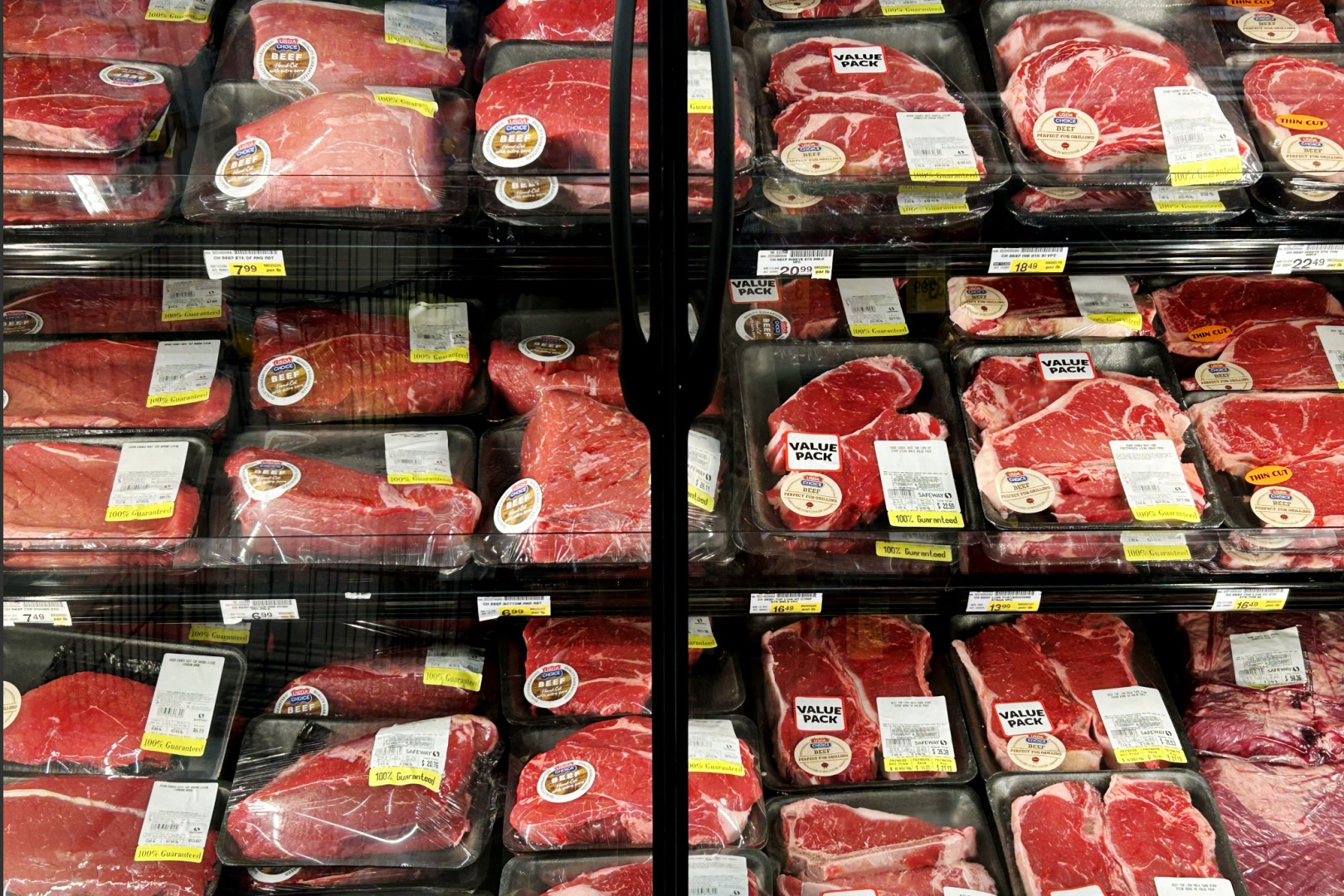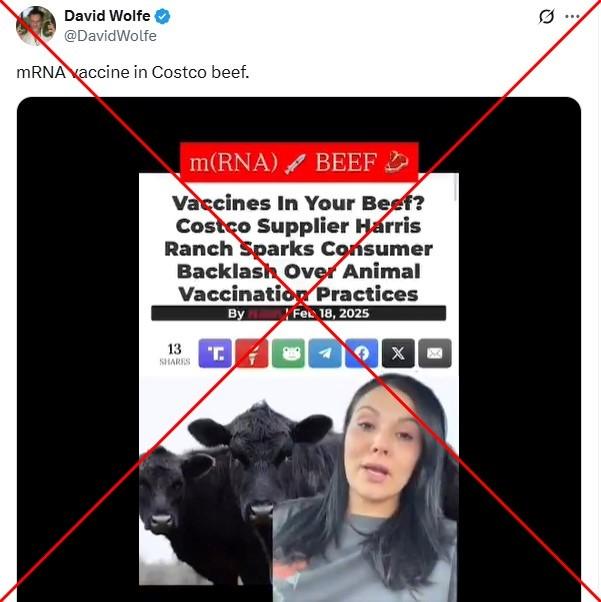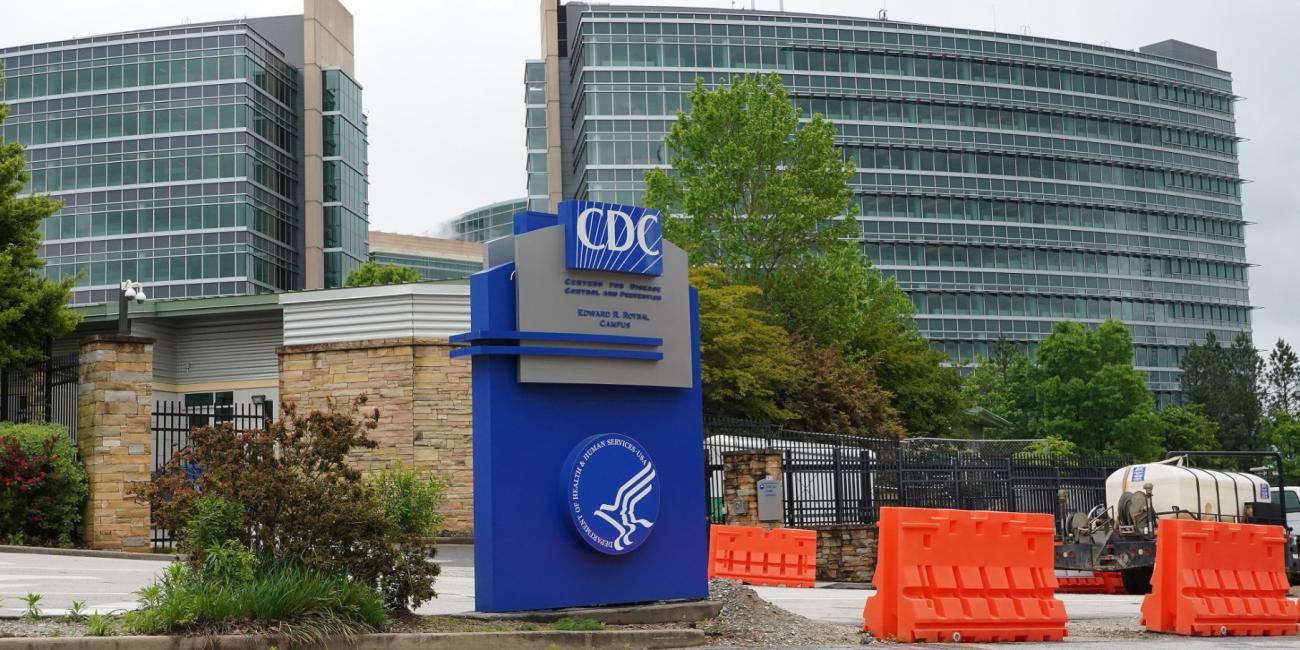
Claims of 'mRNA vaccine in Costco beef' recirculate debunked theories
- Published on April 24, 2025 at 18:48
- 3 min read
- By Satya Amin, AFP USA
Amid a multi-year surge in vaccine misinformation sparked by the Covid-19 pandemic, social media posts claimed that the retail chain Costco sells beef from cattle injected with a shot using messenger RNA (mRNA) technology. This is false and revives a debunked conspiracy theory on efforts to vaccinate people unknowingly through food; mRNA vaccines are not currently approved for use in livestock in the United States and the claims misrepresent support by a beef supplier for inoculations used for years to treat bovine illnesses.
"MRNA vaccine in Costco beef," reads an April 9, 2025 X post by David Wolfe, an American author and raw food advocate who has previously spread misinformation.
Wolfe shares a video originally posted on Instagram, in which a social media user, who has been fact-checked in the past for sharing misleading health claims, alludes to a supposed scheme to vaccinate individuals who refused mRNA vaccines.
"What would be the best course of action if too many people refused the 'you know whats'?" she asks, pointing to her arm and mimicking an injection. "To put it in our foods on a mass scale at one of the most popular wholesale food distributors."

Similar posts spread on X, Facebook, and Instagram. They echo a 2023 conspiracy about mRNA vaccines being transferred to humans via meat that AFP debunked.
First used against Covid-19, mRNA vaccines introduce a molecule that teaches cells to make a certain protein that the immune system recognizes as foreign (archived here). Cells then start to produce antibodies against the protein so that the body will trigger a normal immune response when it encounters the virus.
Vaccine misinformation is rampant online and has particularly impacted trust in the Covid-19 shots, which experts estimate saved millions of lives (archived here).
However, cattle are commonly vaccinated to prevent diseases caused by infectious organisms, such as bovine respiratory disease (archived here).
In a paper written by researchers at the US Department of Agriculture, they called vaccines "a critical component of cattle health management" (archived here).
And the National Cattlemen's Beef Association told AFP in an April 14 email: "There are currently no mRNA vaccines licensed and approved for use in beef cattle."
Nor are they available through prescription by a veterinarian, according to University of Tennessee professor of animal science and extension veterinarian Lew Strickland (archived here).
While scientific exploration of the possible use of mRNA vaccines in livestock has been ongoing for decades, it will not become available until after governmental review and approval (archived here).
"Research trials are being conducted, but that could be years away," said Strickland on April 14, 2025. "mRNA vaccine will not be in any beef products organic or non-organic period."
Harris Ranch statement misrepresented
The false claims followed a social media user posting on X that he recently discovered Harris Ranch Beef Company -- a supplier for Costco stores -- "uses and promotes vaccines for their cows."
The post did not mention mRNA shots, solely citing a 2019 press release by the producer which says it encourages its "ranching partners to make every effort to prevent disease to minimize the need for antibiotic use." Among the methods of achieving this goal, it lists "vaccination protocols to prevent common bovine diseases" (archived here).
But there is no evidence these protocols include shots using mRNA technology.
"Our cattle are not vaccinated with mRNA vaccines," the company said in its 2025 Commitment to Animal Welfare statement (archived here).
Rather, the company statement discusses its use of traditional vaccines to protect animals from illness.
"Our use of any vaccines or antibiotics is overseen by our licensed veterinarians and always follows the recommendations of the National Cattlemen's Beef Association," it states.
AFP reached out to Harris Ranch Beef Company and Costco Wholesale for comment, but no response was forthcoming.
Vaccination does not transfer
Even if cattle producers do adopt the use of mRNA vaccines, eating the meat of inoculated animals would not be an effective method to vaccinate humans, according to animal science experts.
"There is no scientific basis for the claim that if someone was to consume meat or other tissues from an animal that had been vaccinated with an mRNA vaccine, it would enter their body," Timothy Mahony, a professorial research fellow at the Queensland Alliance for Agriculture and Food Innovation's Centre for Animal Science in Australia (archived here), told AFP for a previous story.
This was also made clear by David Verhoeven, assistant professor of vet microbiology and preventive medicine at Iowa State University (archived here). "mRNA vaccines do not last long enough within animals after injection for any component of the vaccine to end up on grocery store shelves," he wrote in The Conversation (archived here).
More of AFP's reporting on vaccine misinformation can be found here.
Copyright © AFP 2017-2026. Any commercial use of this content requires a subscription. Click here to find out more.
Is there content that you would like AFP to fact-check? Get in touch.
Contact us




